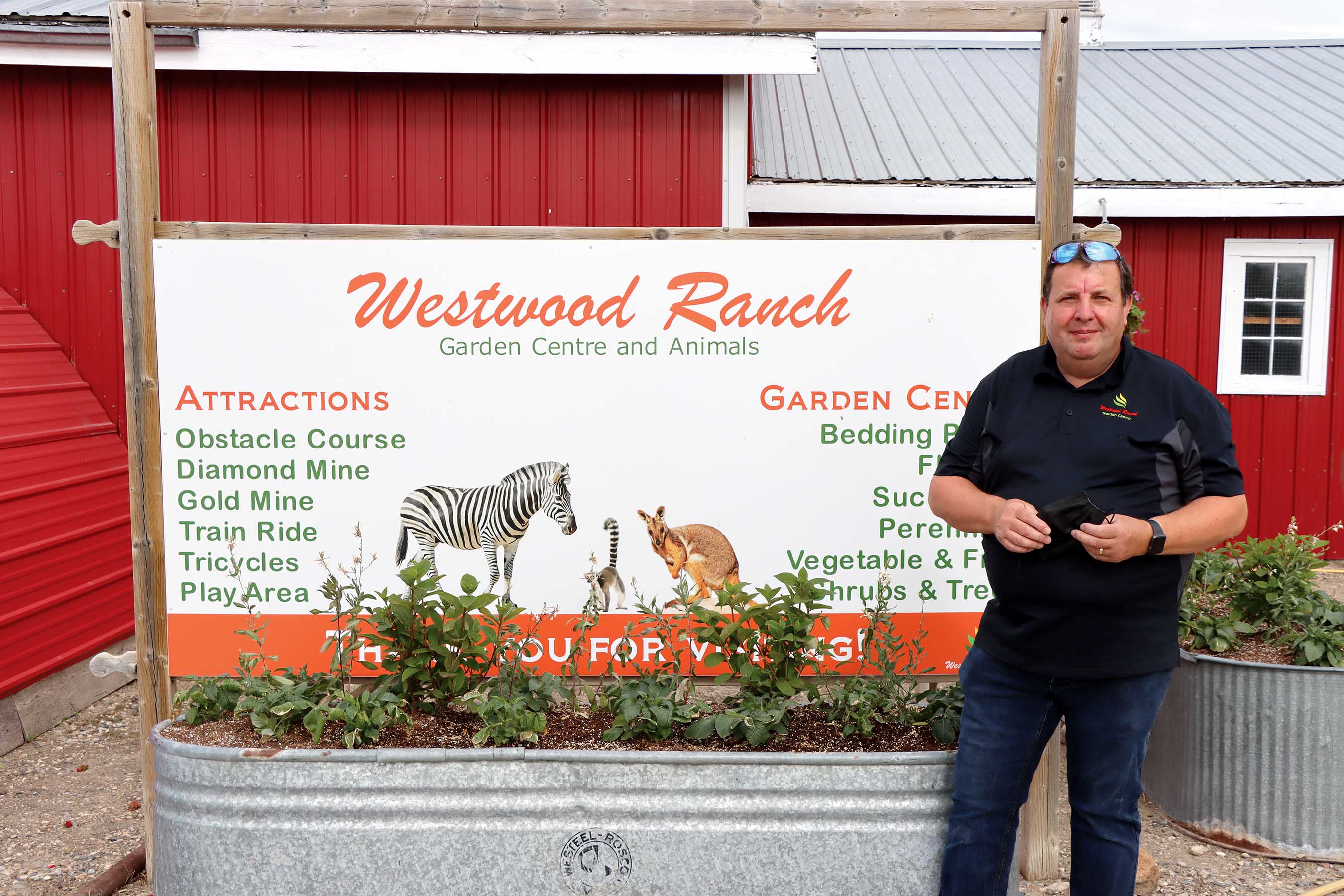Small Manitoba businesses continue to suffer under strict Covid-19 restrictions
June 9, 2021, 9:05 am


Businesses in Manitoba continue to struggle under the ongoing Covid-19 lockdown measures.
The most recent measures, which will remain in effect until at least June 12, include limiting the number of shoppers to one person per household in a business, and businesses are only permitted to operate at 10 per cent capacity.
Westwood Ranch makes cutbacks to keep afloat
For businesses like the Westood Ranch and Garden Centre south of Elkhorn which relies on families and groups, these restrictions are taking their toll.
Owner Mark Humphries says these additional lockdown measures have lowered the amount of traffic in his business.


“This has affected all small businesses, us included because we are family-based and community-based shopping. Greenhouse shopping attracts friends to go out shopping with each other and families to go out, and with our setup with animals on display and a small bistro attraction as well as the garden centre, we attract a lot of families, and this has restricted all family activity.
“We can’t open up for our animals at the moment either so that restriction is being felt and we’ve definitely lost customers and are missing regular customers at this time because they’re not allowed to bring their family,” said Humphries.
With the restrictions already posing a problem, Humphries says there was a second, unexpected issue that had to be overcome.
Being located near the Manitoba-Saskatchewan border, Humphries says he frequently has customers from Saskatchewan that do not know the current restrictions in Manitoba.
“Another bit of confusion we have by being a border business is about half of our customers come from each side of the border. At certain times of the year, we actually get more Saskatchewan customers than Manitoba customers so there’s confusion at the moment as Saskatchewan is opening up its restrictions. So a Saskatchewan family comes here and then realizes that only one of them can go shopping while the rest have to stay in the car. It’s been quite tough for us to police and almost impossible in some cases. I think it is encouraging people to be dishonest because we only have one member of staff on reception and we can’t police every vehicle that comes in and what occupants are in that vehicle. We’re relying on their honesty when they’re coming through that door. I think it’s breeding dishonesty for some who want to come and shop. So we find that quite disturbing, because we are trying to uphold the restrictions and requests of Manitoba Public Health. But the restriction here is very difficult, being a border community. That’s what we’re finding.”
With Elkhorn and area having very few Covid-19 cases through the pandemic, Humphries says that the Government of Manitoba should focus on the centres with high infection rates while letting rural areas remain open.
“On a widespread opinion from people coming in, it is looked upon that we’re being punished for Winnipeg, Winkler, Morden, Steinbach, and that area’s folly.
“There are some there that are total non-believers in the vaccine or the pandemic and as such, they’re totally denying all fact that it exists. So now we have bubbles of high infections in various areas that are causing us all the problems because we are overloaded in the health systems.”
As an example, Humphries pointed out that the Government of Saskatchewan imposed similar restrictions when the two centres saw surges in Covid-19 cases.
“I think Saskatchewan had it bang on right. They shut down Regina and Saskatoon when the numbers were growing in those city areas and they were trying to stop it and to isolate it where the problem was. But here we have a blanket rule that is covering every part of Manitoba, which people are finding extremely irritating because here in rural communities people can police themselves a lot better than the cities can because we all know each other.
“The rules that are being enforced at the moment are necessary if they’re saving lives and they are necessary to help our health service, but I do think it should have been more focused on where the outbreaks are, whether it’s Winnipeg or Brandon or any area like that. They should be on code red, but the rural communities and cities that aren’t experiencing that should be allowed to trade and continue, and it’s the thought of most of the customers that come through my door.”
Humphries says that the Westwood Ranch and Garden Centre has already felt the burden of the pandemic, noting that between 30 and 40 schools tour the ranch yearly but have been unable to since the pandemic restrictions began.
He says these losses have begun to add up.
“We’ve lost a great big chunk of our trade. After our plants go we are reliant on school visits to gain income from the animals so we can carry on feeding through the winter and develop that side of the business, but for the full year last year we weren’t allowed a single school visit, and this year it looks like it’s going to be pretty much the same.
“We can’t do any of our training courses. We usually do planting courses, plant care courses, and gardening courses. We can’t do any of those, which has also restricted our income.”
Even with the restrictions, Humphries says he will keep his doors open as long as possible but expresses concern about other small businesses have also been impacted by the pandemic. “This has affected our income and also our yearly growth which we’ve been building over the years. It’s detrimental to any business, we’re not the only ones.
“We’re trying to keep the doors open for as long as we’re allowed to keep our doors open. At the moment we’re restricted to one family member from one household shopping at a time, so we’re going to carry on being open and abiding by those regulations as long as we can. We’ve had to cut back on staff, we’ve had to cut back on restocking on some of the species that we have, we’ve stopped taking in some of the strays that we usually do just because we’ve had to cut back as much as we can. We’re making cutbacks to sustain ourselves in hope that at some point we get to the other side of it. We’re not destitute, but we are suffering,” said Humphries.
Virden Footwear owner remains optimistic
Other business owners are staying optimistic through the new restrictions.
Clayton Murray, owner of Virden Footwear and Virden Sports and Fashion says that through the current restrictions he has done his best to adapt his businesses to continue to provide services to customers.
But even with new ways to shop, Murray says that most customers prefer to shop in person.
“We’ve been faring as good as we can. We just follow the rules and hope that it’s over soon. It’s a tough environment to do business in, but we do what we can,” said Murray.
“We’ve added curbside pickup, we’ve done more online stuff too but we’ve also found that even though we’ve been trying to implement that, our customers are still wanting that face-to-face buying experience.”
With shopping being limited to only a single person per household, Murray says that he does whatever he can to ensure his customers are able to shop comfortably.
“We have a lot of parents that bring kids in for footwear. There is a spot under that restriction that says that caregivers can bring one child in. So we’ve been asking parents to just keep it to bringing one child in at a time and we’ve had parents take footwear out of the store outside if they need to. We do whatever we can to make it work.”
Murray believes that communities that do not have high infection rates should have eased restrictions, but remains understanding of the complications that come with city-based lockdowns.
“People are angry for sure. They’re angry and frustrated. I don’t believe we should be under the same restrictions as places like Winnipeg, but I don’t know how we would be able to police it either. I think that we should be allowed to operate independently out here. I understand what they’re saying though. If they shut down places like Brandon or Winnipeg then they’ll come out here to shop. That’s their fear.”
Murray remains concerned about the impacts of the restrictions on border communities, however. Being close to the border, Murray says customers may choose to shop in Saskatchewan instead of in Manitoba.
He says this happened during Christmas in 2020, a time that is often the busiest time of the year for many small businesses.
“It has hurt us, it hurt us at Christmas for sure. There were people who went to Saskatchewan while we were locked down. I just hope this pandemic is over soon,” Murray said.
While the financial impacts of the pandemic are taking their toll, Murray remains optimistic.
“We’ve had to mind every dollar we spend. We’ve qualified for only one grant but have fallen through the cracks with the others.
“Last year when this all started I told myself that if this lasted for a year we’d be bankrupt. But here we are. We’ve adapted and we just have to hang on. I feel like with being a small business we’re always on the edge, but this has just made it worse,” said Murray. Tweet



































